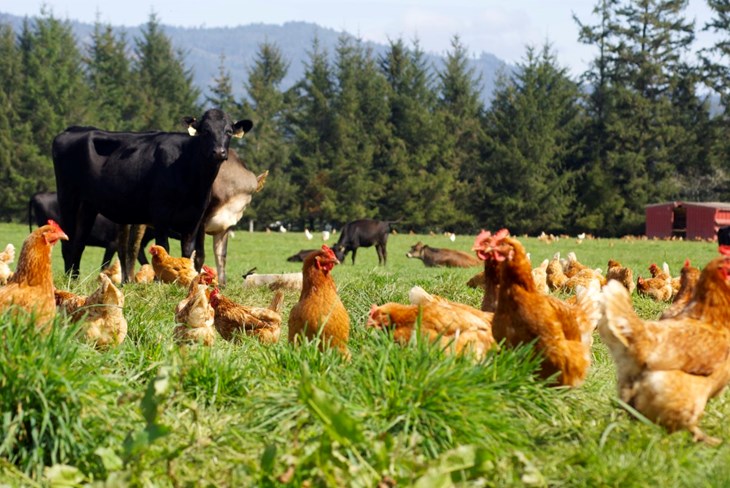12/6/2024
by Alex Cragun
The 2024 election outcomes have the potential to significantly reshape the policy landscape for farm animal protection and sustainable agriculture in the United States. We must understand both the challenges and opportunities ahead for food system reform.
The Farm Bill
Delayed for more than a year, the 119th Congress will address the Farm Bill and the immediate threat to farmed animal welfare, the so-called "Ending Agricultural Trade Suppression" (EATS) Act. This marker bill has the potential to nullify popularly elected state policies like Question 3 in Massachusetts and Proposition 12 in California, which prohibit the sale of pork, veal, and eggs from animals raise in small cages, and stop future state-level progress for most farmed animals. While this is not strictly a partisan policy, the pork industry has positioned the act to retaliate against state-level standards and agriculture regulations. Take action & ask your legislator to oppose the EATS Act here.
Our Priorities for the Farm Bill
The Farm Bill represents a pivotal moment to fundamentally reshape American agriculture for the better. At Compassion in World Farming, we champion bold reforms that create lasting positive change for animals, people, and the planet.
- Championing policy reforms that improve farm animal welfare. This includes strong federal standards and compliance mechanisms, redirecting subsidies to incentivize higher welfare farming practices, and supporting farmers transitioning away from industrial animal agriculture to pasture-based farming.
- Advocate for shifting government investment towards agriculture that feed humans directly, increasing support for higher-welfare animal farming, and expanding access to plant-based options in federal food programs.
- Support policies that accelerate the adoption of regenerative, nature-friendly farming practices. This includes restructuring subsidy programs to reward farmers who implement methods that protect biodiversity, enhance soil and water health, and reduce chemical inputs. We also advocate for dedicated funding to help farmers transition to more practices that work in harmony with natural ecosystems.

These reforms will help create a more compassionate, sustainable food system that prioritizes animal welfare, reduces our dependence on industrial farming, and promotes farming practices that regenerate rather than deplete our natural resources.
The Trump Administration and USDA
In November, President-elect Donald Trump announced Brooke Rollins, the former director of domestic policy for the president and CEO of America First Policy Institute. One of Rollins' first tasks will be engaging in negotiations with both chambers of Congress to pass the Farm Bill.
Additionally, there have been early indications from the incoming administration that there may be further rollbacks of federal oversight of industrial animal agriculture, like the increase in slaughter line speeds approved in Trump’s first term and continued by the Biden Administration. However, recent Trump Campaign and Transition Team statements paint a potential focus on supporting small farmers through the incoming administration.
How Robert F. Kennedy Jr., who was recently nominated to lead the Department of Health and Human Services, and his “Make America Healthy Again,” campaign will affect the administration’s view on federal oversight of the food system remains to be seen. Kennedy’s campaign called for changes to federal policies to improve the food system to benefit the health and well-being of U.S. citizens by investing in small farm operations, updating U.S. dietary guidelines to encourage eating more whole foods, adopting practices that improve the health of our water and soil by decreasing – even eliminating – the use of agrochemicals, and more.
The Rise of Regenerative Agriculture

Regenerative agriculture presents animal welfare environmentalists with an opportunity to work with farmers and a market alternative to industrial animal agriculture. While there is not an agreed-upon universal definition of the term, we advocate for systems that:
- Remove animals from cages and return them to the land.
- Improve soil health and carbon sequestration through adaptive and rotational grazing on native grasslands.
- Improve biodiversity and ecological health by embracing organic, polyculture farming, including minimizing soil disturbance.
- Prioritize the well-being of farmers and farmworkers.
Currently, there is limited federal support for regenerative agriculture, but many policymakers recognize the economic and environmental benefits of this type of farming.
Ballot Initiatives and Factory Farming
Progress for farmed animals rarely comes from Washington, but rather, changes come at the state and local levels. During the 2024 election, three ballot initiatives related to factory farming were included on ballots. A ban on CAFOs in Berkley, California – this passed with a majority vote from residents. This is an important and symbolic win for farmed animals and the environment. A Ban on CAFOs in Sonoma County, and a ban on slaughterhouses in Denver did not get enough votes to pass. However, they proved to be an effective tool for engaging residents around the issue of factory farming.
We anticipate seeing more ballot initiatives like this in the coming years. While the EATS Act threatens to stop these local reforms, we will continue championing local solutions to food system reform.
At Compassion in World Farming, we believe that the fight for a better food system cannot be defined by elections. While federal policy can shape the landscape, the power of collective action, consumer choices, and local government initiative plays an equally significant role. The movement toward a kinder, more sustainable future for agriculture is ongoing and we remain committed to pushing for meaningful changes for animals, the environment, and people.
Take Action
Tell your member of Congress to oppose the EATS Act.
Support local farmers. Ask them questions about farm animal welfare and farming practices!
Learn what to look for on meat, dairy, and egg labels with our Learn the Labels guide.

